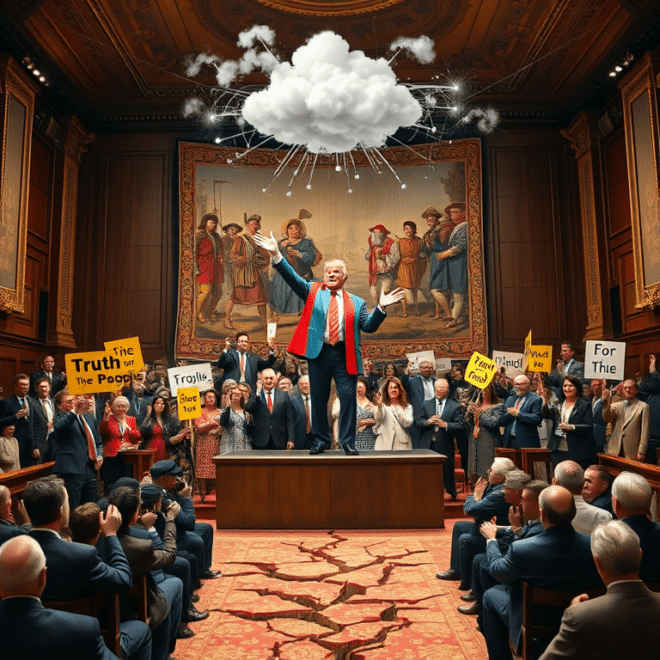
Abstract
Populism’s recent surge has dramatically reshaped the political arena in many democratic nations. A key feature of populist leaders is their unique approach to truth and sincerity. This paper delves into the essence of populist deceit, contrasting it with traditional liberal democratic values of truthfulness and responsibility. We explore how deception is hailed as a subversive tool and its impact on the notion of authenticity in politics. By examining various populist movements and figures, we aim to discern the mechanics of outrage as a communication strategy and its potential limitations in democratic societies.
Introduction
“Populism” has become a buzzword in contemporary political discussions, often used to describe movements and leaders who claim to represent “the people” against a corrupt elite. This phenomenon has been observed across the globe, from the Americas to Europe and beyond. Central to populist rhetoric is a distinctive relationship with truth and authenticity. Unlike conventional politicians, who are expected to adhere to honesty and transparency, populists often embrace deception as a political tactic. This paper seeks to unravel this occurrence, positing that populist deceit is not merely a consequence of political expedience but a strategic maneuver that redefines authenticity within the democratic context.
Populism and Outrage Politics
Populist leaders often operate under a distinct set of principles compared to their liberal democratic peers. While traditional politicians engage in virtue signalling—promoting their morality and commitment to the public good—populists partake in what can be termed “outrage signalling.” This approach aims to connect with voters emotionally, appealing more to their instincts than to their rational thought processes. The populist strategy venerates deception as a demonstration of allegiance to “the people,” suggesting that the outcome justifies the means.
The Emotional Appeal of Outrage
Outrage politics exploits emotional triggers, often rooted in fear, anger, or a sense of betrayal. For instance, leaders like Donald Trump have effectively used social media to amplify grievances against perceived enemies, such as the media or political opponents. By presenting themselves as champions of the ordinary citizen against a corrupt elite, populists create a dichotomy that resonates deeply with their base. This emotional engagement often leads to a blurring of the lines between truth and falsehood, as followers may prioritize loyalty to the leader over factual accuracy.
The Nature of Populist Deception
Populist deception is marked by its boldness and visibility. Unlike traditional cover-ups meant to obscure the truth, populist falsehoods are often blatant and unapologetic. This audacity serves two primary purposes: it communicates to followers that the leader defies conventional standards and fights for the populace’s interests, regardless of the truth. These lies act as a form of authenticity, portraying the leader’s deceit as a dedication to the people’s needs.
The Role of Symbolism
Symbolism plays a crucial role in how populist leaders present their narratives. For example, during his presidency, Trump frequently employed slogans like “Make America Great Again” to evoke a sense of nostalgia and collective identity. This symbolism often overshadows factual discourse, allowing followers to rally around a shared sentiment rather than engage in critical analysis of policies or claims.
Authenticity Reinterpreted
Authenticity has traditionally been valued in representative democracies, with voters expecting politicians to honor their commitments and maintain a consistent public image. Populists, however, have appropriated this ideal, rebranding authenticity as a form of unabashed-ness. Instead of striving for honesty, populist leaders create an image of being instinctively aligned with the people’s experiences, often disregarding facts as they position themselves as champions of the common folk against elites.
The Paradox of Authenticity
This redefinition of authenticity presents a paradox. While populist leaders may initially attract support through their perceived sincerity, the sustainability of this authenticity is questionable. As scrutiny increases and institutional checks are applied, the reliance on deception may alienate voters who demand tangible results. The challenge for populists lies in balancing the appeal of outrage with the need to deliver on promises.
The Influence of Media and Social Platforms
The rise of social media has heightened the effectiveness of populist deception. Platforms like Twitter and Facebook facilitate the rapid spread of misinformation, shaping alternate realities that significantly affect public perception. Populist leaders often bypass traditional media, communicating directly with their audience. This tactic not only fosters a feeling of closeness and connection but also allows them to avoid accountability.
The Echo Chamber Effect
Social media creates echo chambers where like-minded individuals reinforce each other’s beliefs, often leading to a detachment from objective reality. This environment enables populist leaders to propagate falsehoods without facing immediate backlash, as their followers are less likely to encounter dissenting opinions. Consequently, the boundaries of truth become increasingly malleable in the context of populist rhetoric.
Case Studies: Populist Leaders in Practice
To better understand the dynamics of populist deceit, we can examine leaders such as Donald Trump, Jair Bolsonaro, and Matteo Salvini. Each has utilized deception as a strategic means to rally support and undermine established institutions.
Donald Trump
Trump’s presidency is a prime example of populist deception at work. His repeated assertions about widespread voter fraud during the 2020 election, despite a lack of evidence, exemplify how he manipulated truth to galvanize his base. This tactic not only solidified his supporters’ loyalty but also sowed distrust in democratic processes.
Jair Bolsonaro
In Brazil, Bolsonaro’s minimization of COVID-19 and promotion of unproven treatments reflected a similar strategy. By framing his approach as a rejection of elite scientific consensus, he positioned himself as a populist savior, appealing to citizens’ frustrations with bureaucratic responses to the pandemic.
Matteo Salvini
Salvini’s use of social media to craft alternate narratives around immigration and national identity showcases how populist leaders can distort truth for political gain. By portraying migrants as threats to societal cohesion, he effectively rallied support while diverting attention from more complex socio-economic issues.
Are There Limits to Populist Deception?
While populist deception can be powerful, it raises critical questions about its sustainability. A significant factor is voters’ tolerance for dishonesty. As populists gain authority, they often encounter institutional checks that challenge their narratives. The question remains: how long can populist leaders thrive before the public demands accountability?
The Role of Institutional Resistance
Institutional resistance plays a crucial role in countering populist deception. Courts, legislative bodies, and independent media serve as checks on populist leaders, potentially undermining their narratives. However, the effectiveness of these institutions varies across different political contexts, influencing the longevity of populist movements.
The Authenticity Paradox
The sustainability of populist authenticity presents a dilemma. As scrutiny and institutional resistance increase, their reliance on deception might backfire. Followers initially drawn to their leaders’ brazen style may become disenchanted if promised results do not materialise. The challenge for populists is balancing the appeal of outrage with delivering concrete outcomes.
The Consequences of Disillusionment
Disillusionment among supporters can lead to a significant decline in political capital for populist leaders. If followers perceive a gap between rhetoric and reality, they may seek alternatives, potentially leading to a shift in the political landscape. This cycle of outrage and accountability creates a dynamic tension that populist leaders must navigate.
Conclusion
Populist deception marks a significant shift from liberal democratic norms. By reimagining authenticity and embracing unabashed-ness, populist leaders challenge the very essence of truth in politics. While this strategy may connect with specific voter groups, it raises crucial questions about accountability and the future of democratic governance. As populism progresses, understanding the interplay between deceit and authenticity will be essential for scholars, politicians, and citizens alike.
References
• Moffitt, B. (2016). The Global Rise of Populism: Performance, Political Style and Representation. New York: Routledge.
• Mudde, C., & Kaltwasser, C. R. (2017). Populism: A Very Short Introduction. Oxford: Oxford University Press.
• Pappas, T. (2019). Populism and Liberal Democracy: A Comparative and Theoretical Analysis. Oxford: Oxford University Press.
• Wodak, R. (2015). The Politics of Fear: What Right-Wing Populist Discourses Mean. London: SAGE Publications.

